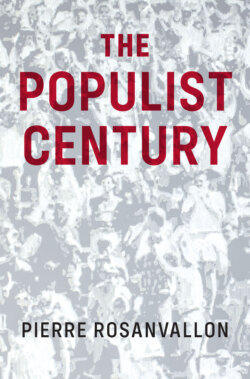Читать книгу The Populist Century - Pierre Rosanvallon - Страница 31
Notes
Оглавление1 1 François Guizot, speech delivered April 1, 1846 (in a discussion of a trade agreement with Belgium), in François Guizot, Histoire parlementaire de France (Paris: Michel-Lévy frères, 1864), vol. 5, p. 120.
2 2 See Friedrich List, National System of Political Economy, trans. George-Auguste Matile, Henri Richelot, and Stephen Colwell (Philadelphia: J. B. Lippincott, 1856 [1841]); citation from p. 77. List’s stance was different from that of Johann Gottlieb Fichte, who advocated an autarchic protectionism along political lines.
3 3 As reflected in the familiar watchword “There is no alternative” (TINA).
4 4 See the emblematic work of Alain Supiot, Governance by Numbers: The Making of a Legal Model of Allegiance, translated from the French (Portland, OR: Hart, [2015] 2017). Let us note that the question of the comparative virtues of management through fixed rules as opposed to an approach that privileges political decision-making has been addressed in numerous works in economic theory. See the seminal article of Finn E. Kydland and Edward C. Prescott, “Rules Rather than Discretion: The Inconsistency of Optimal Plans,” Journal of Political Economy 85, no. 3 (1977): 473–91.
5 5 Marine Le Pen, Pour que vive la France (Paris: Grancher, 2012); the book was her manifesto in the 2012 presidential campaign.
6 6 Jacques Généreux, Nous, on peut! Manuel anticrise à l’usage du citoyen, 2nd edn. (Paris: Seuil, 2012).
7 7 “The irreversible character of the installation of immigrant populations,” Marcel Gauchet notes, characteristically, “… presents the interesting feature of having totally avoided, from beginning to end, all debate and democratic decision-making.” Gauchet also speaks in this connection of a “wounded popular feeling of sovereignty,” emphasizing moreover that “xenophobia is not racism,” that it is rather a “feeling that one can contain within the circle of democracy” (La démocratie contre elle-même [Paris: Gallimard, 2002], pp. 220–2).
8 8 On this point, see my analysis in The Society of Equals, trans. Arthur Goldhammer (Cambridge, MA: Harvard University Press, [2011] 2013).
9 9 Let us recall that the original name of this political party (in 1989) was “Northern League for the Independence of Padania.”
10 10 This party stressed from the start the greater expenses of the welfare state in Wallonia.
11 11 Let us note that various social scientists have emphasized the connection between the homogeneity of populations and the willingness to accept redistributive activities: see for example Robert Putnam, “E Pluribus Unum: Diversity and Community in the Twenty-First Century,” Scandinavian Political Studies 30, no. 2 (2007): 137–74, or Alberto Alesina and Edward L. Glaeser, Fighting Poverty in the US and Europe: A World of Difference (Oxford: Oxford University Press, 2004).
